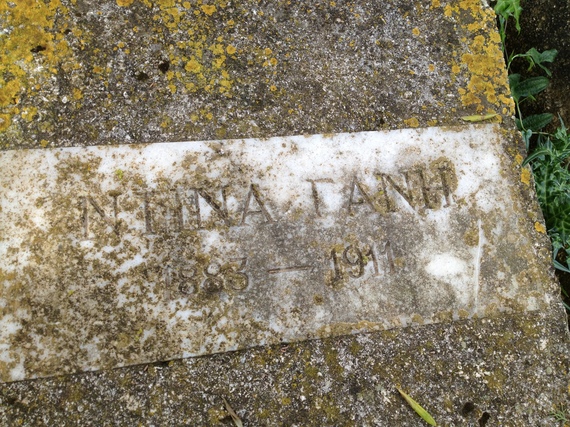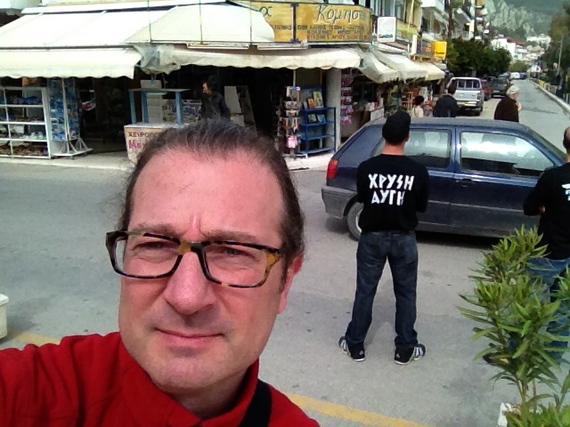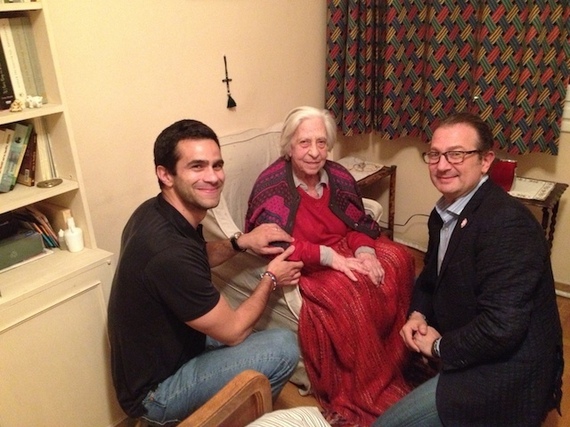As a teenager, I would sit and listen to my immigrant father's "war stories" from the dark years of the German occupation of his native Crete. Despite the horrors he experienced when he was only a teenager, I didn't really care to listen much. After all, sitting still for this would result in the same rolling-eye-reaction from most kids my age.
Years later, I studied abroad for a year at the American College of Greece in Athens. There, I learned about Greece's role during World War II and how instrumental the Greek resistance was in delaying Hitler's advances into Russia and ultimately changing the course of the entire war. Funny how it works about parents becoming so much wiser in the eyes of their kids as we grow older, but my dad's war stories of yesteryear suddenly became important to me. Soon, the history I had been told about my ancestors became an obsession and I started recalling them, one after another, seeking corroboration or some sort of validation from history.
One of the stories Dad had told me repeatedly was about a "brave priest and a brave mayor" who saved an entire community of their island's Jews who were being hunted by Hitler's SS. My father knew a lot about the Greek-Jewish community because he grew up in the Jewish neighborhood of Hania, near the Venetian harbor, literally around the corner from a then-active 15th century synagogue called Etz Hayim, that still stands today.
Fast forward to my Modern Greek history class at the American College of Greece in the early 90s, where I read about the "brave priest and brave mayor" my father spoke of years earlier who were actually the island's Greek Orthodox Archbishop, Metropolitan Chrysostomos; and its mayor, Loukas Karrer.
There, in a textbook, I read a corroborated version of my father's story about the only community of Jews under Nazi occupation that survived the Holocaust intact. While entire populations were wiped out, I read of the humanity of the Zakynthian people and the notion that among the thousands of people on the island, not one collaborated to turn in even a single Jew. Because of the collective-yet-singular commitment of the population of this island, every single member of the Jewish community survived. Like Schindler's List, but just as remarkable, this was the story of an entire island of people who refused to satisfy Nazi hate.
I loved the story and started sharing it wherever and however I could. Surprisingly enough, reactions never seemed to go beyond a "wow, what a great story" until January of this past year when, once again, I took the opportunity to share it on my Huffington Post blog. On International Holocaust Remembrance Day, January 27, 2013, people were writing and paying tribute to those who had perished during one of the ugliest periods in human history. I, on the other hand, decided to write about those who tried to stop the Holocaust -- and included the story of the mayor and archbishop from Zakynthos in my piece.
The day the article was published on the Huffington Post, I happened to be driving with Steven Priovolos, who was a volunteer for the 2013 Gabby Awards and offered to help create a video tribute in honor of Sid Ganis, our Lifetime Achievement Award recipient (a Greek Jew himself). And now the story gets better...
My Huffpost blog post went viral thanks to Arianna Huffington's re-tweeting it to thousands of her own followers. Add that to thousands of Facebookers and Tweeters sharing and reposting it, and you might get some idea of the cyber-undercurrent going on that day. And if you know anything about iPhones and social media, you know that if you don't switch off your "notifications" when you are re-tweeted, mentioned, tagged or re-posted, your phone vibrates every time and notifications just keep popping up.
This was all happening during my conversation and car ride with Steven down Hollywood Boulevard on our way to a meeting. Being the Attention Deficit Disorder-afflicted person that I am, I kept looking at my iPhone. Bothered, Steven remarks, "That's quite annoying." It was then that I got my first lecture from him about "being present" while I am around people. After profusely apologizing for my social faux pas, I tried to explain the viral re-tweeting phenomenon that was taking place -- to a man who doesn't even have Twitter or Facebook on his own phone. I then proceeded to tell him the story-- about Chrysostomos, Karrer, Zakynthos and the back-stories I knew about this amazing time in Greek history.
Steven remained silent as he drove down the boulevard lined with Hollywood Stars and palm trees. I actually thought he was angry. But on the contrary -- he was enthralled. And by the time I was knee-deep into the story, he actually pulled the car off to the side of the road and stopped and asked, "Greg, did this really happen?"
I laughed. "It's not just my dad's story; The state of Israel itself checked out its authenticity." Indeed, both the Archbishop and the Mayor (the protagonists of the Zakynthos survival story) had been honored by the Yad Vashem Memorial following a rigorous policy of painstaking research before recognizing non-Jews who saved Jews during the Holocaust.
Steven then looked me as if the clouds had just parted and the sun was shining on the Hollywood sign atop a distant hill. "Greg, we need to share this story. We need to make a film about this."
As you can guess, the rest is already becoming history. This very personal story of my father's that I held in my memory for decades has now taken a snowball's ride down the side of a mountain, thanks to Steven's determination and abiding enthusiasm.
Today this true tale is well on its way to becoming a short film, produced by the Greek America Foundation with Steven as its cinematographer, a British screenwriter named Mia Christou and well-known production designer/art director Giles Masters, known for his work on films like Angels and Demons, The DaVinci Code, Tomorrow Never Dies and many more.
By February of 2013, just a month after Steven embraced my passion for this story and endorsed my efforts, we were on a plane to Athens, thanks to the generosity of George Bourkoulas and Atlas Travel of Detroit as well as Olympic Airlines, who provided flights to Zakynthos. We were determined to meet the people and see the place where this amazing story unfolded.
Upon our arrival in Athens, we met with Mr. Nikos Lalotis, an angel of a man who outlined the entire landscape of pre and postwar Zakynthos, at a downtown coffee shop. Laliotis was in his 90s but his memory was sharp, enabling him to provide us with names of people on the island we would ultimately go and visit in the days to come.
A quick flight later led us to meet our Zakynthos host, Dimitris Skalistiris, who is a local photographer and man of many passions -- just one of which was hugging people with great gusto. His motivation was to help us share this important story of both the Zakynthian people as well elaborate on the compassionate heartbeat of the Greek people in general. "We are not a hateful people," Dimitris told us. "Greeks love humanity."
Soon we had embarked on a non-stop 3-day journey to learn all we could about Zakynthos, its people and the story itself. We met locals who were present during the 1940s and visited relevant historic sites. Our jaws dropped as we came to realize just how far back this community of Jews went on this island when we visited the Jewish cemetery whose permanent residents dated back to the 1200s.
As we strolled by tombstones, we read names etched in the stone in both Greek and Hebrew, along with stars of David and other Jewish markings. Several of the tombs we noticed bore the last name "Ganis." Although we were told that this was a common Jewish name and a big family, it was still ironic that the man we were honoring at the forthcoming Gabby Awards and the only Greek Jew that we had told about our project was named Sid Ganis. I snapped photos with my iPhone and texted a few to Sid.
We met men like Nikolaos Lountzis -- a 90-year old who broke down in tears while pulling out a cross he wore around his neck that was given to him by the Jewish boy that was hidden in his home who he said was "like his own flesh and blood".
We also met Ioannis Rapsomanikis, whose mother ordered her children to allow their Jewish guests to eat first because "...you never know when they might have to flee," citing that she wouldn't want them doing this on an empty stomach.
We came to learn that the Jews of Zakynthos survived by hiding in plain sight, because their protectors -- the ethnic Zakynthian Christians -- didn't consider them any different. As the nearly-deaf, Rapsomanikis told us, "They were our family. While they were in our homes, we played with them, fought with them, called them our sisters and brothers, and shared meals with them. It wasn't even a matter of confusing the Germans, because they hadn't a clue in the world."
Rapsomanikis also shared the story of a pregnant Jewish woman who had been hiding in his village and went into labor during the occupation. "It was the Nazi himself who we turned to fetch the midwife because she didn't have transportation to come to our village. Imagine the irony," he chuckled and continued. "The very people who were hunting the Jews actually helped the perpetuation of the race!"
The contemporary Greek Orthodox hierarch of the island, also named Chrysostomos corroborated this, as did everyone we spoke to on Zakynthos. "They were equal residents," noted the Archbishop. "We didn't see them any different, any less, or any inferior to us because they were Jews and we were Christians. They were Greeks, like we were," he said while sipping on his Greek coffee in the courtyard of the massive Metropolitan Cathedral of St. Dionysios, which was partially rebuilt after the big earthquake of 1954 with the financial assistance and manual labor of the Jewish families of Zakynthos, many of whom had long ago settled in Israel but remained connected to their island.
As I was leaving the church, I stumbled across a rally of the Neo-Nazi "Golden Dawn" political party that was making headlines across Greece and the world. I was overcome with the awesome responsibility to tell this story -- as soon as possible -- not just for history's sake, but also for the sake of contemporary Greece.
It was a shocking display of irony to hear them chanting their hatred directly in front of the Cathedral where only a few decades earlier the decision was made by the resident Christian Archbishop to save every Jew on the island.
Before leaving the island, we were able to meet the stately Marlen Karrer, the niece of the famous mayor. She told us of the mayor's wife, her "Thea" Lilly, who was only 28 when the Nazis invaded Zakynthos. We were to learn that Lilly was now living in Athens and although nearly 100 years old and "had her wits about her." One introduction continued to lead to another, as Marlen arranged for us to meet Lena (Karrer) Kriezi -- the daughter of the mayor with whom her mother was pregnant the year the Nazis invaded the island and demanded the Jews be turned over.
Lena was warm and welcoming in her Athenian home. She showed us photos of her father and newspaper clippings from the Yad Vashem ceremony that took place at the Israeli Embassy in Athens in the 1970s. Still, the visit with her was remarkable. Then she asked, "Would you like to meet my mother?"
Steven and I looked at each other in disbelief as we were directed into the bedroom of one of the most angelic women I have ever met in my life. Lilly welcomed us into her room and asked what our business in her home was in the calmest and gentlest of ways. We explained to her that we wanted to tell the story of her courageous mayor husband, the Archbishop, and all of the other heroic residents of Zakynthos.
She looked at us serenely and said, "Emeis den kaname tipota. Den ipirhan iroes" ("We did nothing. There were no heroes.")
Steven and I looked at each other -- thinking that perhaps she didn't remember or that perhaps her advanced age had clouded her mental recollection. The translation of the next thing Lilly said is, "No. There were no heroes. We merely fulfilled our duty as humans."
And so we must be truthful. The real reason we are making this film springs from this powerful yet touching dialogue with Lilly Karrer. Our film is not meant to peacock about Greek heroes -- even if we have good reason to do so -- because, as Mrs. Karrer put it, there were no heroes.
It was pure goodness and humanity that motivated an entire island population to protect its own residents no matter what the cost or prospective danger. We feel we have a responsibility to remind the world of that goodness and that humanity -- something we believe the world as well as the Greek people are thirsting to hear about during such troubled times.
As of December, 2013, our film project was halfway funded, having brought in more than $60,000 from 300+ donors throughout the world. The movie trailer at the 2013 Gabby Awards in Hollywood evoked roaring applause, after which we began active fundraising and have not stopped since, with generous donations coming from people like Canadians Frank and Roula Kakouros with a brief note attached that read, "You must tell this story."
Our first crowd-funding campaign brought in nearly $15,000 starting with a contribution by Eleni Kourouklis of Pittsburgh. More donations began pouring in. $5 from New York City, $1000 from London, $500 from Salt Lake City... and so on.
The story has spread like wildfire. We've received notable newspaper coverage in Greece and Canada as well as the U.S. And we have even located and identified Jewish survivors originally from Zakynthos who now live in Tel Aviv.
During an October 2013 visit to Israel, the Greek Prime Minister was greeted by Israeli PM Benjamin Netanyahu with the story of the Zakynthos as an example of the common bond shared by the two countries. In subsequent remarks after the official speeches, Netanyahu mentioned that he was proud that a team of Greek-Americans was making a film about this story.
We expect to wrap up funding by the beginning of the New Year and begin pre-production by early 2014. Plans include shooting the movie on the island of Zakynthos as well as in Hania, Crete, where a completely preserved Venetian town and a 15th century synagogue still stand, sharing architecture with what World War II-era Zakynthos looked like. (Keep in mind that most of Zakynthos was destroyed by an earthquake in 1954 and only three buildings remain from the pre-earthquake period, making exterior shots impossible.)
We have a round of new key supporters as well: the renown photographer Roy Schweiger from Tel Aviv has been a big help on the ground there, helping to identify and arrange meetings with the Zakynthos survivors. Inspired by the project, he has also graciously offered to serve as our set photographer.
So to add the sweetest icing of all to the cake, the one and only Sid Ganis -- the former president of the Academy of Motion Picture Arts & Sciences and one of the most respected and prolific executives in Hollywood is officially on board as the film's executive producer. We've also secured Aegean Airlines as the official airline carrier of the film project, adding a valuable connection between Greece and Israel when our production actually begins.
Our final crowd-funding campaign is in full-swing as new donors and supporters come on board by the day.
In Greece and throughout the world -- Golden Dawn continue to make headlines. Because of that, the time is now to make this film a reality. Its impact will be more powerful than angry online posts or even commentaries decrying the Neo Nazi movement in Greece during debates on television. No.
We will not respond with politics and anti-Neo Nazi rhetoric; instead we will respond with a lesson from history that demonstrates the purest kinds of love and humanity during a time during which the world wondered what the future would hold if Hitler had succeeded. The time is now to illustrate the victory of humanity over hatred. The time is now to share the story with the world when every single resident of the Greek island of Zakynthos stared Hitler's army of terror in the face and said... No!
p.s. please consider adding your voice to this unknown story.


